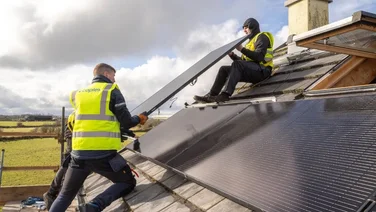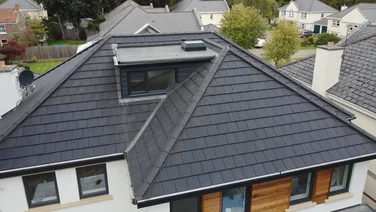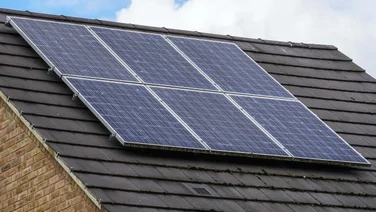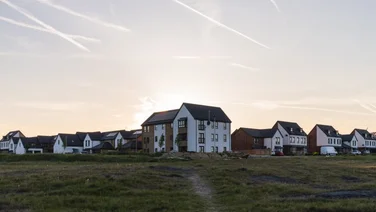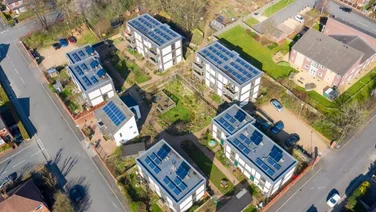- Solar panels can reduce the amount of grid electricity you use by half
- Your ability to install solar panels will depend on the area you live in and the type of flat you own
- If you’re a tenant, you’ll need to ask your landlord for permission
- Funding is also available through government grants, such as ECO4 or through green loans from banks
- You don’t need permission to install a balcony solar panel
Solar panels can halve the amount of grid electricity you use, saving you £272 on your energy bill if you happen to live in a two-bedroom flat, according to the latest Ofgem figures.
In fact, flat owners will make a £2,601 profit after 25 years – the average life expectancy of a solar panel.
However, flats are often left out of the solar panel discussion, as are renters. This is because getting permission to install panels for a flat can be complicated if you don’t own the entire block. It’s not impossible, however.
In this article, we’ll give a full guide on where you can install solar panels, the costs, available schemes and the benefits of installation.
If you’re already clued up on solar panels in flats and are ready to proceed with installation, we can help. Simply enter a few details in this short form and we’ll put you in touch with local installers, who’ll provide free, bespoke quotes.

Can I install solar panels if I live in a flat?
Yes, you can install solar panels and benefit from solar power if you live in a flat, whether you own or rent. However, it is a bit more complicated than it would be you lived in a house. This is because you can’t decide on your own to make any changes to whole block of flats, unless you own the building.
Whether or not you can install solar panels will depend on the area you live in and the type of flat you own. Some local authorities and managing agents will allow you to install solar panels if you own the top-most flat. But if you own a middle – or ground – flat, you probably won’t be legally allowed to put solar panels on the roof.
Repowering London says you will need a licence for alteration to install any solar panels, which is free from your freeholder, but will likely have a fee associated with it. If you rent, you will need to discuss installing solar panels with your landlord. Watch solar expert Ramin Hakimov talking about sharing solar power for flats on Positive Energy podcast – powered by The Eco Experts, below:
What permissions do I need?
The type of permission you’ll need to install solar panels on a block of flats will depend on the following factors:
- Who owns the block of flats
- Where the block of flats are located
- Where you are planning to put our solar panels
- How big your solar panels are
- How many you want to install
If you’re a tenant, you’ll need to ask your landlord for permission – as previously mentioned – before installing solar panels. If you own a flat, but not the whole building, you will need to get permission from relevant authorities, such as the building management company.
If you want to mount solar panels on the exterior of your block of flats, such as the roof or walls, you’ll need to check which restrictions apply within your local authority and whether planning permission is needed.
For example, if your block of flats is a listed building, you need to get Listed Building Consent, followed by planning permission before installation can take place. If your flat is in a conservation area, you need to contact your local council.
When implementing a shared solar panels system on your block of flats, you need to check if your neighbours own part of the roof. If they don’t and you’ve obtained all the relevant permissions, you don’t need their permission to install solar panels.
However, if you are planning on installing them, do let them know so they’re aware of any upcoming works to the flats.
You might even be able to install solar panels on a council house, but you’ll need to check with your local authority to see if this is possible.
How much can I save by installing solar panels?
Installing solar panels on flats have the potential to save you around 50% on your electricity bills, and 70% if you utilise the Smart Export Guarantee (SEG), but more on that below.
If multiple flats share a solar panel system, it’s likely that more of the electricity produced by the panels will get used, instead of being sent back to the grid.
This is because the electricity generated will likely be used more evenly throughout the day in a block of flats, since people will be using electricity at different times.
As a result, a block of flats, on average, sharing solar panels will consume around 80% of the electricity they generate, compared to 50% for the average detached house, according to Allume Energy.
How are solar panels on flats financed?
Solar panels on flats are usually financed either collectively by the people who live in the individual flats, or by a larger organisation.
In most cases, people who own the flats will each pay their share. But if solar panels are being installed in social housing, they’ll often be financed by the local council.
Funding is also available through government grants, such as ECO4 or through green loans from banks.
You can read more about current and previous solar panel grants through our guide: How to get UK grants and funding for solar panels
Can I earn money from having solar panels on my flat?
Homeowners can earn money from having solar panels on their flat through the government’s Smart Export Guarantee (SEG), which allows solar panel owners to sell the unused energy their panels generate back to the grid.
This means, if the solar panels are being used to power your flat – whether you have a shared solar panel system or a private one – then you can earn money through the SEG.
But if you live in a block of flats where the solar panels have been installed to power communal areas – such as lobbies, lifts and corridors – then the building owners or landlord will benefit from the SEG, not the people living in flats.
Where is the best place to install solar panels on a block of flats?
You can technically install solar panels on the wall of a block of flats, or even on the ground next to the wall.
However, we usually recommend placing your solar panels on a south-facing roof, at an angle of between 20 and 50 degrees. Your panels will then be exposed to more sunlight, which will generate more electricity for you.
There isn’t an issue if your roof is flat or steeper than 50 degrees, however. You will just need to invest an additional mounting frame system that will angle them the right way – although this will likely increase the overall cost.
There is also a chance it might not be possible, so check with your installer before investing.
Solar panels can also be mounted on the walls of your flats. Although wall-mounted solar panels are easier to maintain than roof-mounted solar panels, they tend to produce less energy because they’re not usually exposed to as much sunlight.
The panels can be installed parallel to the wall, but will generate more electricity if they’re at an angle.
The rooftop solution
Rooftops on flats are too small for flats to really benefit from solar panels, also the more flats there are in a block of flats, the less roof space available to individual tenants to install a big enough solar panel system to power each flat.
The good news, however, is there are options. Allume Energy, for example, launched its SolShare solution.
According to the solar panel installer, SolShare is the world’s only technology that can connect multiple flats to a single rooftop PV array and share it fairly between residents.
It works by allocating the exact kWh that each flat needs and analyses your energy data for every connected flat. It also helps increase the EPC banding for flats.
The SolShare system costs between £2,500 and £5,000 pet private flat and can be installed in social housing and on new builds.
Schemes like SolShare aim to help reduce the bills of lower-income households. In England, rented social housing made up 16.6% of homes in 2022, so more social housing with solar panels will also go towards reducing the UK’s emissions as a whole, without large investments from those who can’t afford it.
This can also be where community solar projects can also help. This is because community solar projects allow multiple flats in the same building to access the electricity generated from roof solar panels.
This opens up the possibility of solar energy to any flat owner, not just the ones on the top floor.
Can you install solar panels on your balcony?
Installing solar panels on the balcony of your flat can be a quick and easy way to use solar energy. You don’t need permission to install a balcony solar panel, however if you are renting, it’s best to inform your landlord of your plans.
You can usually set up a balcony solar panel yourself, as it’s a small plug-in portable system, which comes with a portable solar-powered generator. These types of panels can easily move with you, which is a huge bonus if you’re renting.
The challenge is plug-in solar panels don’t often provide enough electricity to power an entire flat, but they can be used to power appliances, which would still lower your energy bill. The amount of power generated will depend on your system’s size and sun exposure.
A small UK flat will typically use around 1,800 kWh of electricity per and homeowners will need at least six panels to provide this level of electricity.

What are the benefits of using solar panels on flats?
Installing solar panels will help you reduce your monthly energy bills, as you’ll reduce your dependence on the national grid. You’ll still rely on it a little, unless you invest in a solar battery.
You’ll also reduce your carbon footprint and increase your property value. Solar panels have a long lifespan, so while it’s an expensive investment initially, the profit you’ll earn after 25 years makes it a worthwhile investment.
The average 1-2 bedroom will need six panels, which will cost £4,215. Based on Ofgem’s current electricity price per unit of 22.36, it will take 15.66 years to break even. Over the course of a solar panel’s lifetime of 25 years, you can expect to make a profit of £2,601.07.
Summary
- To power a one-to-two bedroom flat, you’ll need around six solar panels, which will take up around 12sq metres. This will produce enough electricity to cover approximately 46% of your annual usage
- How many solar panels and how much electricity you generate will depend on the size of your flat, the efficiency of your solar panels and the amount of sunlight your flat is exposed to
- Solar panels for a flat can save 0.42 tonnes of CO2 per year and help reduce energy bills by £272 per year. They can also increase the value of your flat by 2%
- You can invest in community solar panels, which are mounted on the roof of a block of flats to supply electricity to multiple flats
- If you live on the top floor, you can install solar panels yourself. If you don’t, plug-in solar panels are an option, especially if you have a balcony
- Let your neighbours know you’re going to install solar panels before you go ahead with an installation.


